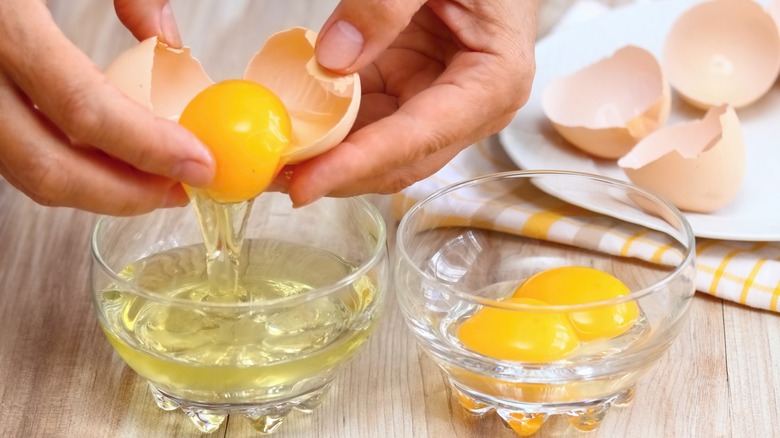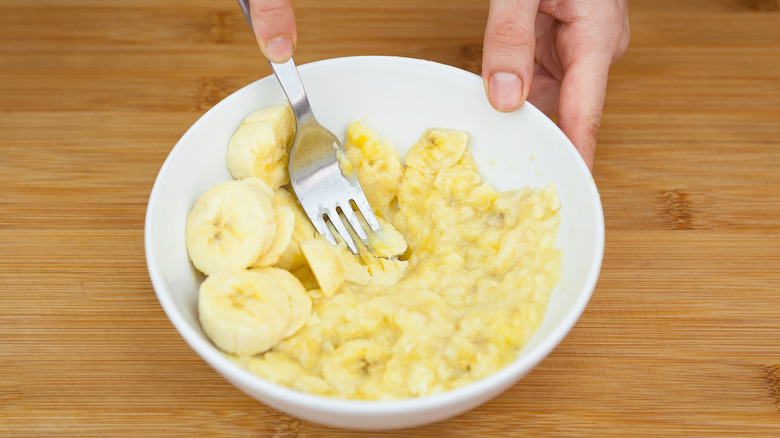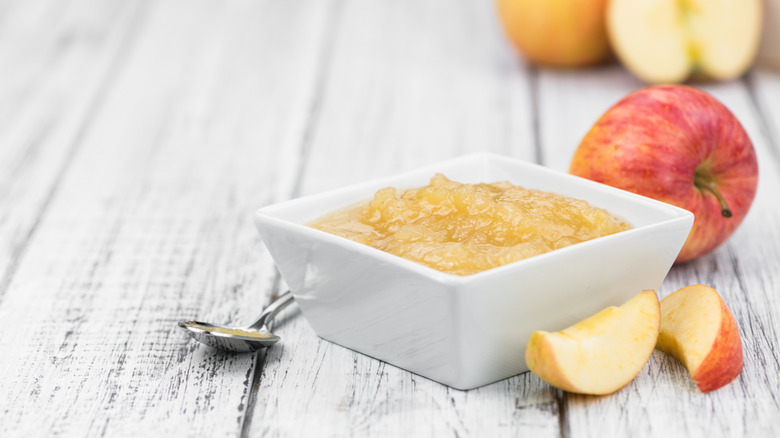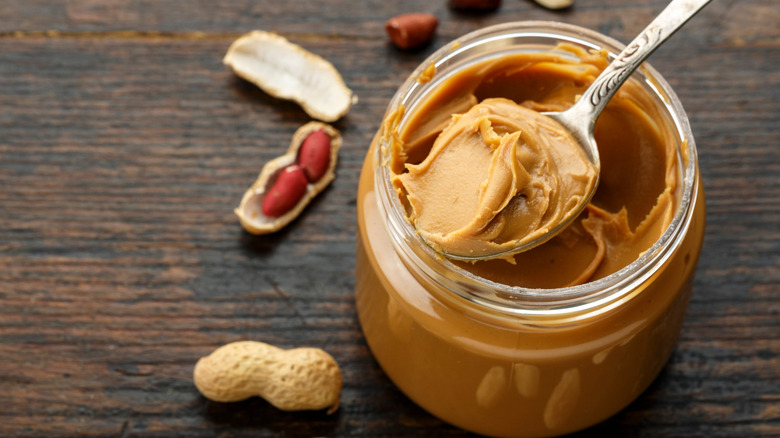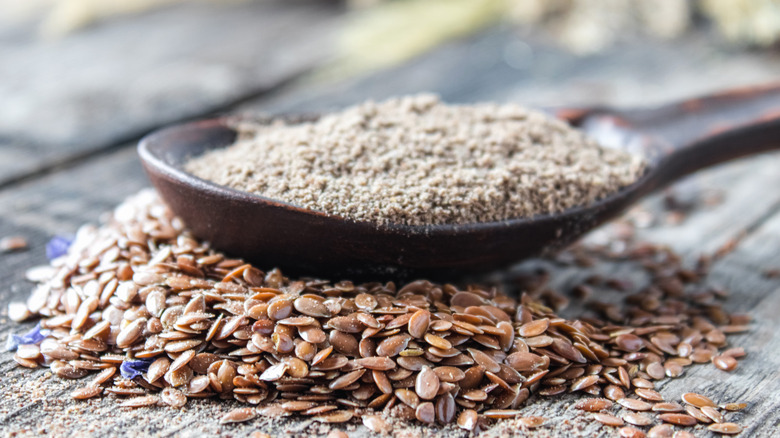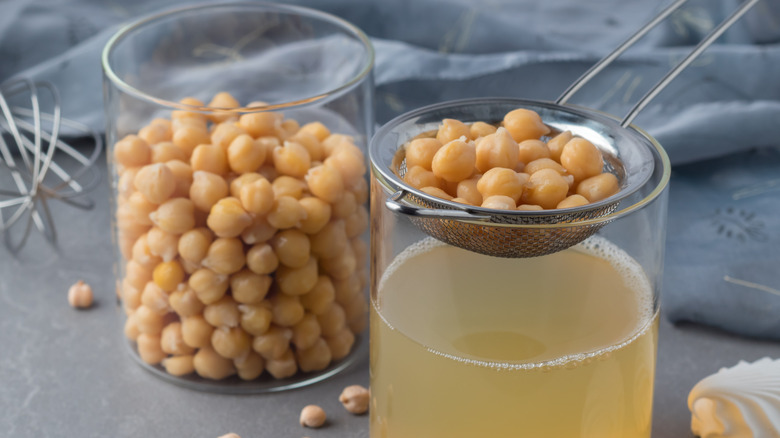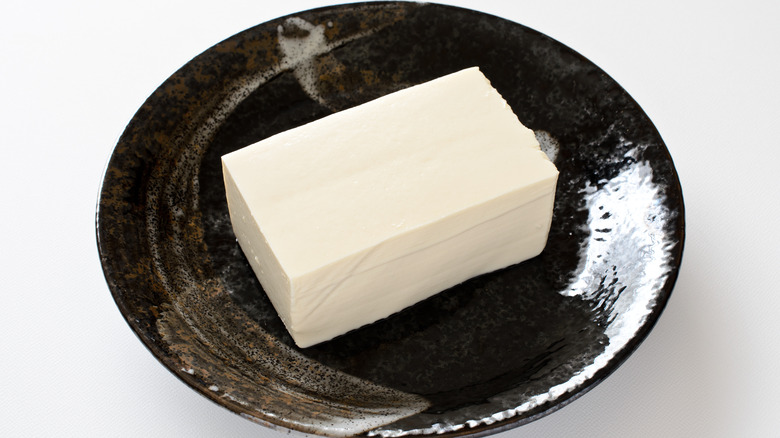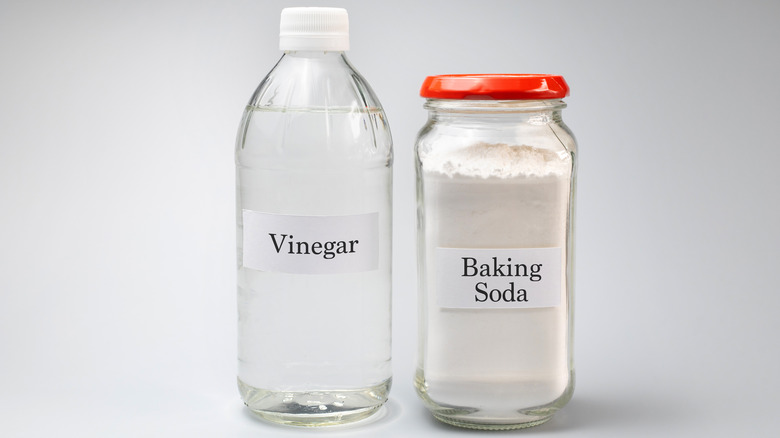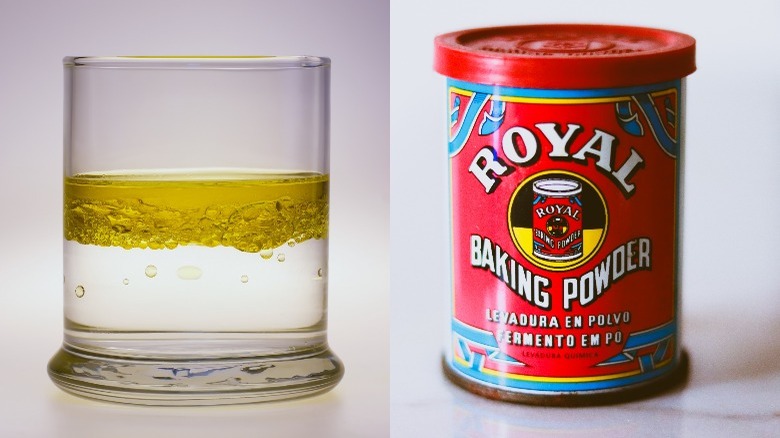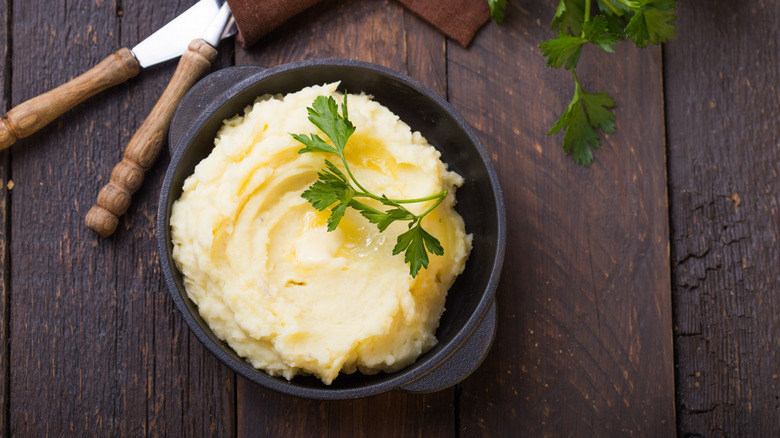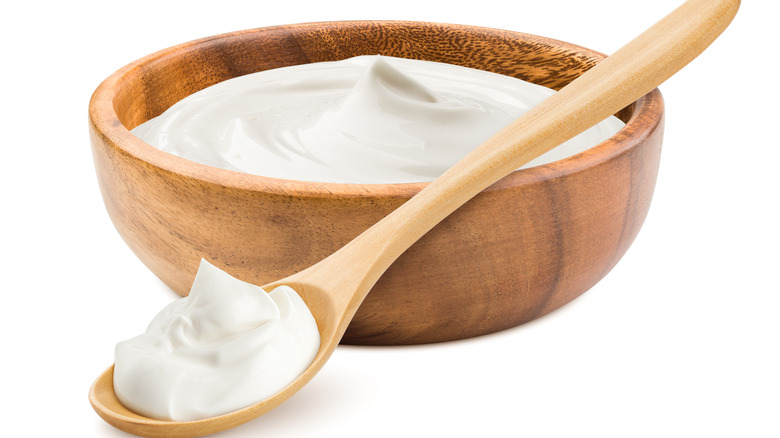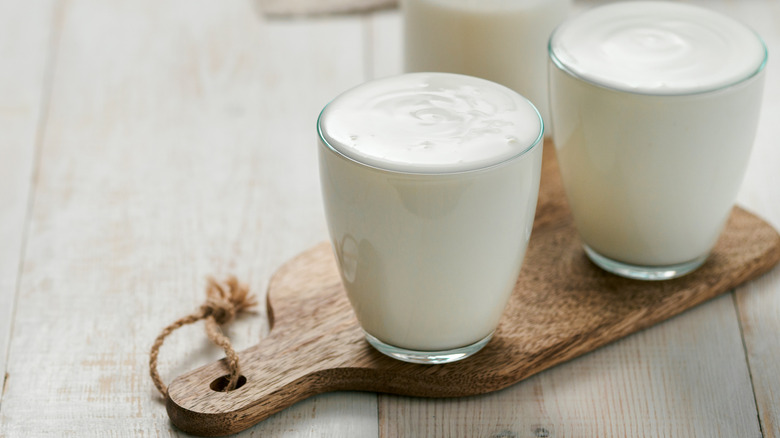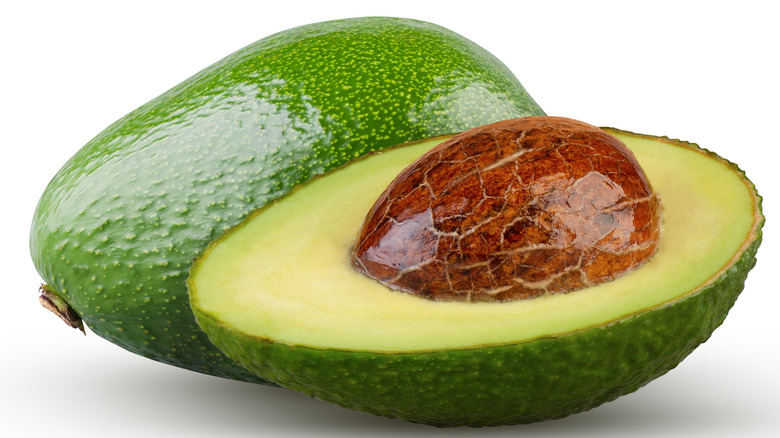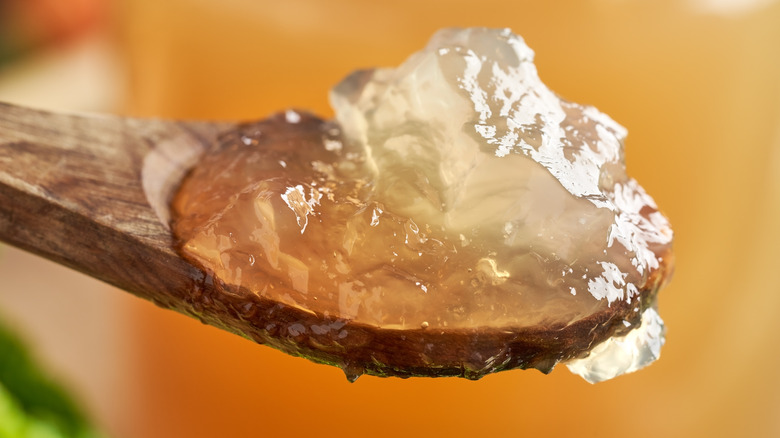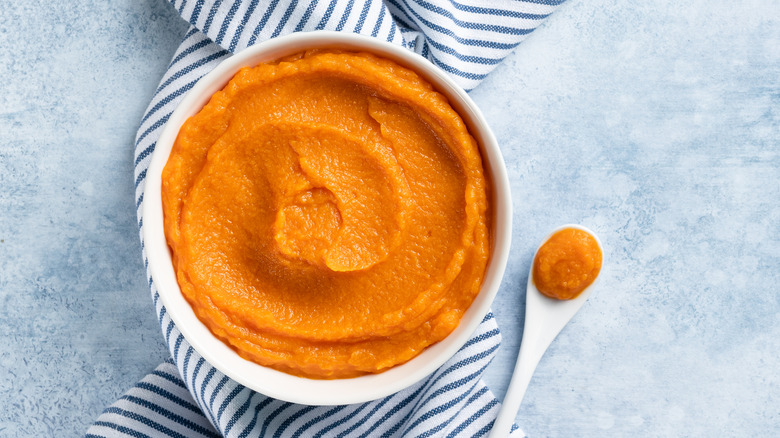15 Best Substitutes For Eggs When Baking
There are a few ingredients you always want to make sure you have stocked in your kitchen, and eggs are definitely one of them. Not only are they an incredibly versatile food, they can also be used to make some amazing cocktails like the whiskey sour and, of course, play a major role in baking. As Healthline notes, eggs provide moisture and flavor to your favorite pastries and also act as either a binding or leavening agent.
But alas, the multitude of uses for eggs in the kitchen can actually be the ingredient's downfall, as it increases the chances of finding yourself stranded with an empty carton when you suddenly get the urge to whip up a cake or a batch of brownies. Sure, you could make a quick trip to the grocery store to pick up another dozen, but why go through the hassle if you don't have to? You may actually have perfectly acceptable egg substitutes right there in your kitchen. Whether you used up all your eggs for breakfast or are looking to find a vegan alternative, there are plenty of options that you can use as a substitute for eggs when baking.
1. Bananas
For many, bananas are also a must-buy during a trip to the grocery store — even moreso now that banana bread has skyrocketed in popularity. If you happen to be one of the many people that have stocked up on the fruit recently, you've got an excellent solution on hand for baking when there are no eggs to be found. As The Pioneer Woman notes, bananas are an excellent source of moisture for your favorite treats. However, they won't be helpful in the leavening department, so you'll want to make sure your recipe also calls for something like baking soda or baking powder.
Using bananas in place of eggs is an exceptionally easy substitution as well — simply use one-quarter cup of mashed banana for every egg that your recipe calls for. It is important to keep in mind that you will more than likely be able to detect the fruit's distinct flavor in your final product. Therefore, if you don't want to alter the taste of your recipe at all, there may be a better substitution on this list for you to try.
2. Applesauce
If you've ever done a Pinterest search for "healthy dessert swaps," you've likely seen applesauce mentioned more than a few times, as it can be an effective replacement for both oil and eggs in baking. When using the pureed fruit product in place of eggs specifically, The Pioneer Woman reports that it will act as a binding agent that also provides plenty of moisture — though, like bananas, you'll want to make sure that you have another leavening agent at work in your recipe.
When using applesauce as your egg replacement, follow the same ratio as mashed bananas by using one-quarter cup for each egg. It is important to take note of what kind of applesauce you've got on hand as well. Unsweetened works best, but you can still use a sweetened or flavored variety if that's all you have, just make sure to cut back on the other sweeteners that your recipe calls for (via Healthline).
3. Nut butters
It's always good to have an emergency jar of peanut butter on hand when you're craving the nostalgia of a PB&J, but did you know that it can also replace the eggs in your baked goods? As it turns out, this surprising swap — which will work with whichever nut butter you prefer the most — might even do a better job than eggs do at acting as a binder while also adding some bonus nutrition to your favorite sweet treats (via Pioneer Woman). Nut butters can have a potent taste, so it's best to make this swap when you're already making something with a nutty flavor, like cookies or pancakes.
When opting for this substitution, you'll want to make sure you have the creamy version of your favorite peanut, cashew, or almond butter, which you can use three tablespoons of in place of one egg. Women's Health also suggests adding a splash of liquid, such as water or almond milk, to make it a bit easier to work with.
4. Ground flax seeds
Flax seeds are another potential egg replacement that can give your baked goods a nutritional boost. According to Healthline, the popular smoothie additive is a great source of protein, omega-3 fatty acids, and fiber, as well as vitamins and minerals, meaning you'll have even more of a reason to go back for a second treat when using them in place of eggs. However, flax seeds add a denseness and nutty flavor that might not work in every recipe. Rather, Cookie & Kate suggests reserving this option for things like muffins, simple cookies, and recipes made with whole wheat flour.
You don't want to dump a bunch of ground flax seeds into your batter, either. Instead, you want to create a "flax seed egg," or "flegg," by combining together three tablespoons of warm water with one tablespoon of finely ground flax seeds (via The Pioneer Woman). Give the mixture about 10 minutes to thicken up and then use in place of one egg in your recipe.
5. Aquafaba
Aquafaba may have a fancy name, but it isn't something you'll have to go searching a specialty grocery store to find. This product is actually the starchy liquid leftover from a can of chickpeas or other canned beans, making it yet another easily accessible substitution for eggs in your baking ventures.
You may notice that aquafaba is similar in consistency to raw egg whites, but it has much more use than whipping up a vegan meringue; per The Kitchn, its composition also gives it the ability to emulsify, gelatinize, thicken or act as a binder in your recipes. No need to worry about this product altering the taste of your baked goods either, as The Kitchn ensures the residual bean flavor will disappear during the baking process.
According to Rainbow Plant Life, you can use one tablespoon of aquafaba to replace one egg yolk, two to replace one egg white, and three tablespoons as a replacement for one whole egg in your baked good recipes. You'll want to make sure you whisk the bean liquid for about 45 seconds when using it as a whole egg substitute so it gets a fluffy, foamy texture.
6. Silken tofu
You may not have even known about silken tofu a year ago, but thanks to everybody's favorite food-hack sharing social media platform, TikTok, the ingredient has really gotten a chance to shine. According to Healthline, this version of the soy-based product has a higher water content and softer consistency than the regular tofu often used in cooking. Once mashed or pureed, silken tofu gets a smooth and — dare we say it — silky texture that makes an excellent plant-based and flavorless replacement for eggs.
There is one downside to this egg replacement, though. Per Healthline, silken tofu can leave your baked goods denser than if you were to make them with eggs. For that reason, it's best to save this swap for things like brownies or pie fillings, where you can use ¼ cup pureed silken tofu as a replacement for one egg.
7. Carbonated water
It may seem surprising that you can replace the almighty egg with something as simple as carbonated water in your baked goods, but this swap actually yields some amazing results. Per Healthline, this substitution works especially well in recipes for cakes, cupcakes, and breads because the carbonation will trap the air bubbles, leaving you with a final product that is "light and fluffy."
In fact, The Kitchn even gave it a 10 out of 10 in their quest to find the best possible egg substitution, noting that when using it in a recipe for vanilla muffins, the final product was almost identical to the batch that used eggs. It also won't affect the taste of your treats, so long as you don't accidentally use a flavored version like LaCroix or Waterloo.
When swapping eggs for carbonated water, you can use ¼ cup of the fizzy stuff in place of one egg in your recipe.
8. Vinegar and baking soda
We're taking a walk down memory lane with this amalgamation of pantry staples, which you may recognize from your seventh grade science fair project. However, instead of using vinegar and baking soda to make a papier mâché volcano erupt, you can revisit the combination to make a replacement for eggs, particularly when they're the main leavening ingredient in your baked goods (via The Pioneer Woman). Similar to what you demonstrated in class all those years ago, the mixture of vinegar and baking soda will induce a chemical reaction that Healthline says is exceptionally great for cakes, cupcakes, and breads, as it will leave them "light and airy."
Distilled white vinegar is the best option to use, though apple cider vinegar can also work, so long as you don't mind a slight fruity taste to your treats. A combo of one tablespoon of the tangy liquid plus one teaspoon of baking soda can replace each egg in your recipe, though instead of combining the two together right off the bat, Women's Health suggests adding the vinegar in with your wet ingredients and the baking soda in with the dry to avoid starting the reaction off too early and making a mess.
9. Water, vegetable oil, and baking powder
Vegetable oil and baking powder are two other common pantry ingredients and, when combined with water, create another Alton Brown-esque egg replacement that you can put together when the next time you're spending an afternoon baking in the kitchen. Similar to a vinegar and baking soda concoction, The Pioneer Woman says that this one works best in recipes where eggs are acting as the sole leavening agent, like in muffins or scones, and is also suitable for those following a vegan diet.
According to The Kitchn, you can replace one large egg with a combination of two tablespoons of water, one teaspoon of vegetable oil, and two teaspoons of baking powder. However, using too much of this substitution can render your final products on the oily side, so you should only use this mixture when your recipe requires three eggs or less.
10. Mashed potatoes
We've shared a few interesting substitutions for eggs on this list, but you probably never expected to see mashed potatoes on this list. As it turns out, the side dish that everybody loves to eat on Thanksgiving can add some serious moisture to your baked goods, making them an unconventional yet surprisingly effective option for the times you find yourself lacking in the egg department. You don't have to save leftover mashed potatoes from the night before, as instant mashed potatoes do the job just fine.
Per G-Free Foodie, either one-quarter cup of last night's side dish or two tablespoons of instant potato flakes will do the trick. Mashed potatoes are a great choice when baking breads and rolls.
Panic mode no longer needs to set in when you run out of eggs. As you can see, there are plenty of suitable choices for baking around the house that will save you from that last-minute trip to the grocery store.
11. Yogurt
Per The Spokesman Review, plain yogurt is an especially good substitute for eggs in baked goods because it not only binds the ingredients as eggs would but it also leavens the dough and helps to make those breads and baked sweets deliciously moist. According to Craftsy, Greek yogurt is also a healthy baking substitution. It goes through a straining process that results in a far thicker consistency than other yogurts and gives it higher levels of protein as well as less sugar and carbs.
In baked goods, the yogurt for egg substitution is quite a straightforward process. All you have to do is replace every egg with one-quarter cup of plain yogurt (via She Knows). Keep in mind that it should be left to come to room temperature and then gently folded into the dough in order to ensure that it blends smoothly into the dough and doesn't break.
12. Buttermilk
According to Country Living, there are various types of buttermilk: cultured, sweet cream, and sour cream. The difference between these is that milk, fresh cream, and fermented cream are used for each respectively. The magic of transforming these dairies occurs during the fermentation process, which gives buttermilk its characteristic sour flavor. Its culinary possibilities are endless. You can use it for cooking or baking brunch treats like scones, pancakes, and waffles. In addition, not only will you find it in ranch dressing, but it can also be used in soups and breads (via Live Science).
The great thing about baking with buttermilk is even if you don't have any on hand, or simply don't have the time to wait out the recommended 12 hours of fermenting, per Sugar & Spice by Radhika, you can easily whip some up using half a cup of whole milk and lemon juice from a single lemon. All you have to do is bring the milk to a boil on the stovetop and add lemon juice, at which point you can turn off the stove and allow the mixture to curdle for one minute. When the curdling is done, run the mixture through a sieve and use the liquid. If your baking recipe calls for one egg, half a cup of liquid will serve as its equivalent. Buttermilk is best used as an egg substitute in recipes where the eggs are mostly there to provide moisture.
13. Avocado
No stranger to the green breakfast smoothie and toast, nor forgotten upon many a health bowl, loaded burrito, or as a secret ingredient in a moist chocolate cake, the avocado has come to be known as one of the world's favorite healthy foods. According to Everyday Health, avocados pack a mean dose of good fat, fiber, and potassium. Fortunately, as mentioned in the case of moist chocolate cakes, this magical fruit can be used to great effect in baked goods. Per Justin Dunham, the high fat content found in avocados is exactly the thing that makes them a good egg substitute because fat equals moist, tender bakes.
It's worth noting that even though you can use avocado in place of one or two eggs, it doesn't perfectly replicate eggs — in fact, it's more of a butter effect that you're incorporating into the baked good. So while it may work for brownies or cake, avocado won't work the way eggs would in a meringue or a souffle.
14. Gelatin
Gelatin is so versatile that many people may not even know how often they are consuming it. According to Medical News Today, this compound is made by processing various animal tissues. It can act as both a thickener and gelling agent in dishes like sauces, soups, gummies, and even pharmaceutical products. Its nutrient profile boasts a number of benefits, ranging from supporting digestion, bone strength, and sleep to acting as a cosmetic aid for skin. Per The Curious Coconut, its uses extend to baked goods too; including cookies, muffins, and pizza crust.
The best way to make this substitution is by mixing one tablespoon of gelatin powder with three tablespoons of filtered water at room temperature for every one or two eggs the recipe requires. If you need three or four eggs, add an extra tablespoon of water for each egg. For best results, stick to four "eggs" maximum; you could very well make more, however, the higher the number of eggs a recipe asks for, the higher the risk of coming out with a wonky texture and flavor in your baked goods when using gelatin as a substitute.
15. Pumpkin puree
Whether you've enjoyed it as the star of the show in a cake or a pie or as a surprise element in your waffles or pancakes, as it turns out, with its ability to replace eggs, pumpkin puree's autumnal flavor profile is not the only thing that makes it a great baking ingredient. In case you're wondering if canned pumpkin is the same thing as pumpkin puree, you'll be pleased to know that it's the same ingredient with different names.
According to LiveStrong, while substituting pumpkin puree for eggs will add a light pumpkin flavor, it'll likely not be enough to overpower the other tastes in your recipe. To make the substitution, all you have to do is replace each egg with one-quarter cup of pumpkin puree. If your recipe calls for wet and dry ingredients to be mixed separately and then combined, mix the pumpkin puree with the wet ingredients before combining them with the dry ingredients. Note that you can also substitute pumpkin puree for oil in baked goods. The ratio for this substitution is 1:1 by volume.
